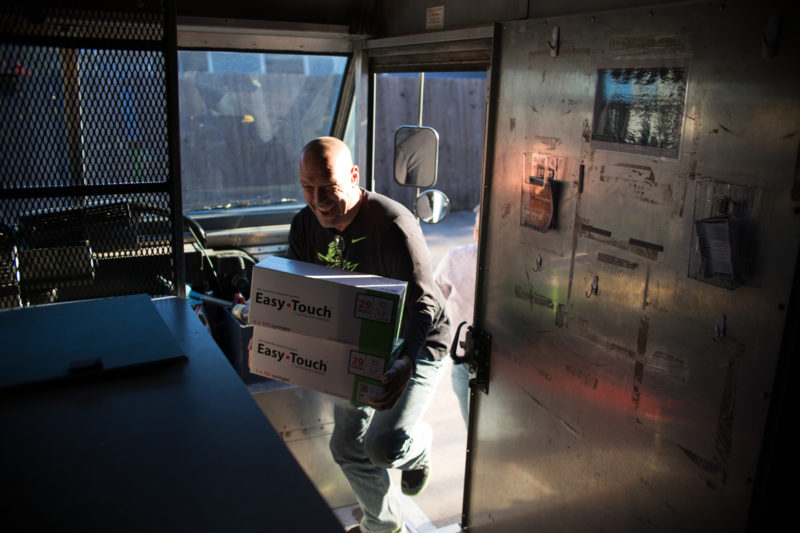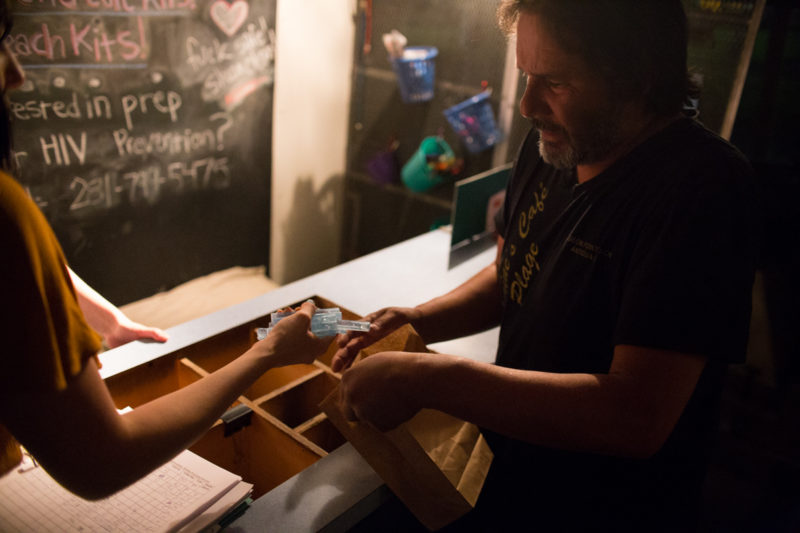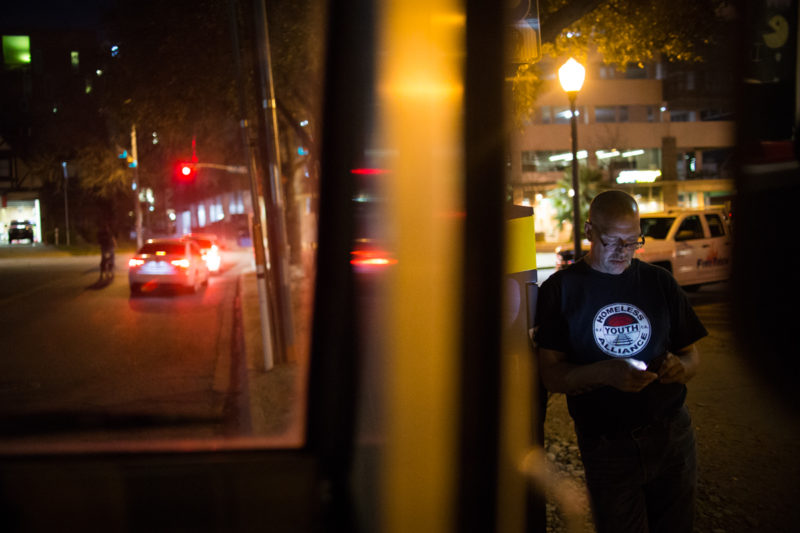Syringe Exchange for Drug Users Hopes to Emerge From the Shadows
By Molly Smith
Photography By Lynda Gonzalez
Reporting Texas

Mark Kinzly, a staff member with the Austin Harm Reduction Coalition, loads syringes onto the outreach van. The nonprofit provides services to injection drug users to prevent overdoses and curb the spread of diseases such as HIV. Lynda Gonzalez/Reporting Texas
This story was updated on March 9.
Volunteers with the Austin Harm Reduction Coalition are just about to wrap up their Saturday afternoon shift when a young woman enters the delivery van parked on a quiet East Austin street.
“My boyfriend and I are about to move,” she sheepishly explains as she dumps hundreds of used syringes into a collection bucket labeled “hazardous.”
She’s gathered most of her dirty syringes in a plastic bin but has also used an empty Pop-Tarts box, so as not to stick herself or anyone else. People use all manner of containers to store used syringes, from brown paper bags to metal cash boxes to Hot Tamales boxes.
The Austin Harm Reduction Coalition is a nonprofit that runs the largest syringe exchange program in Texas. People can swap used syringes for clean, sterile ones at no cost. They also can pick up sterile saline and water ampoules, cookers, cotton balls, tourniquets and alcohol swabs, as well condoms and Naloxone, a drug that prevents overdoses.
Most people are in and out of the van in less than five minutes. Some shifts see only a handful of people, while others have a couple dozen.
As prescription drug and opioid abuse sweeps the nation, more states are considering creating syringe exchanges. The Austin coalition is a model for what wide-scale syringe exchange could look like in Texas.

Nurse Claire Contreras hands sterile water for injection to a visitor to the outreach van. Lynda Gonzalez/Reporting Texas
Mark Kinzly has worked with syringe exchanges across the country and now is a main volunteer for the largest syringe exchange organization in Texas. He is optimistic that the Legislature will legalize syringe exchanges this year after several false starts.
As it stands, it is illegal in Texas to purchase or possess syringes for the purpose of injecting illicit drugs.
As a result, the coalition operates in a gray area, and its success is due in large part to the fact that the Austin Police Department leaves it alone.
“We don’t have any kind of partnership with AHRC,” police spokeswoman Lisa Cortinas said in an email.
Kinzly said police “tolerate” the organization and its operations. “But then again, we’re not in their face about it,” he explained. The van is unmarked, and it spends no more than an hour at the sites it visits during its weekly outreach.
History suggests the operation is not risk-free. In 2007, the Legislature authorized Bexar County to establish a pilot syringe exchange. The measure did not exempt volunteers from the state’s drug paraphernalia law, though, and San Antonio police arrested three exchange volunteers. Although the misdemeanor charges against them eventually were dropped, the program shut down.
Kinzly is aware of at least seven other “underground” exchanges in the state, but none compares in size or scope to the one operating in Austin. Last year alone, the coalition collected and distributed nearly 250,000 syringes and 7,800 doses of Naloxone.
The coalition adapts to changing circumstances. Volunteers are currently educating users about the importance of testing their drugs for fentanyl, a synthetic opioid that is 30 to 50 times more potent than heroin. Volunteers pass out fentanyl test strips and encourage people to bring positive ones back so they can track the prevalence of fentanyl-laced heroin in Austin.
Texas lawmakers have debated syringe exchange since the 1990s. A bill authorizing pilot exchanges in the seven largest counties passed the House in 2015 but died in the Senate when Lt. Gov. Dan Patrick prevented it from getting a hearing, said Bill Martin, the senior fellow for drug policy at the James A. Baker III Institute for Public Policy at Rice University.
Kinzly said he has discussed a bill with Rep. Toni Rose, D-Dallas. On March 7, Rose filed House Bill 3256, which would allow pilot programs in Travis, Harris, Bexar and Dallas counties.
“Many people believe that syringe exchange programs assist users to engage in illegal activity,” Rose said via email. “The truth is that SEPs allow social workers to interact with the user community in a way that positions them to be the first step for recovery, guiding those who are ready toward treatment programs.”
Across the nation, ensuring access to clean syringes has become an issue that lawmakers from both sides of the aisle can get behind. As governor of Indiana, Vice President Mike Pence signed legislation in 2015 to allow exchanges in counties experiencing HIV or hepatitis C epidemics. That same year, U.S. Senate Majority Leader Mitch McConnell led the effort to lift the federal funding ban on syringe exchanges. While federal money still cannot be used for syringes themselves, it can support other aspects of the programs.
Using clean needles and syringes reduces injection drug users’ risk of getting and spreading HIV, hepatitis C and other blood diseases, according to the Centers for Disease Control and Prevention. The CDC, the American Medical Association and the World Health Organization endorse syringe exchange.
“The science on needle exchange is so clear,” Martin said.
Texas spends nearly $2 billion a year on health care for opioid abusers, according to an analysis by Matrix Global Advisors, a Washington, D.C.- based economic consulting firm.
Kinzly and Rose hope the potential savings will appeal to Texas lawmakers dealing with a budget crisis. Treating one instance of HIV costs anywhere from $350,000 to $700,000 over a lifetime, he said. Clean syringes, on the other hand, are less than 10 cents.
“In a budget strapped year, this solution should be on the table,” Rose said.
The Austin coalition operates on an annual budget of about $350,000, most of which comes from private foundations. The Houston-based Episcopal Health Foundation has awarded it two grants totaling more than $500,000 since 2015.
“The thing that impressed us is that they are providing very much needed medical care for a population that has been very disconnected from the health care community,” said program officer Katy Butterwick.
Kinzly, a former injection drug user, said that connection is an essential part of recovery. He credits syringe exchange with helping him get clean more than two decades ago.
“Addiction is an illness of separation – of family, society, of all these things,” he explained. “The antidote to separation is connection. If people can set aside what they think they know about drug users and allow them to get connected again to society, they may make a different decision.”
In addition to the syringe exchange, the coalition provides HIV and hepatitis C testing, medical care and drug treatment referrals from its East Austin office. When someone decides to stop using, they’ll have a support system in place, Kinzly explained, and a number of volunteers are former users.
Martin said syringe exchanges remain a difficult sell at the Legislature. “Part of it is not understanding, part of it is just rejection of science, part of it is lack of compassion for people who would benefit from this, and a good bit of it is the fear of being demagogued and primaried,” he said.
If a bill makes it out of the Legislature, there’s no guarantee Gov. Greg Abbott would sign it. Abbott vetoed a “Good Samaritan” bill in 2015 that would have shielded people who call 911 to report an overdose from being charged with small-time drug possession.
Kinzly remains undeterred.
“The argument [against syringe exchange] is that it’s morally wrong,” he said. “But morally wrong is when you have a proven, effective intervention and you don’t do it. It’s ethically and morally wrong.”

Mark Kinzly is a volunteer for the largest needle exchange organization in Texas. Lynda Gonzalez/Reporting Texas